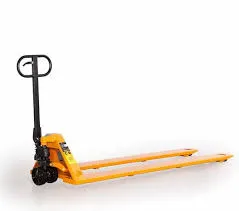


The Versatile Pallet Cart An Indispensable Tool for Modern Warehousing
In today's fast-paced logistics and warehouse environments, efficiency is paramount. One essential tool that has gained prominence in warehouse operations is the pallet cart. This simple yet effective device streamlines the movement of goods, enhances productivity, and significantly reduces the physical strain on workers. Understanding the functionality and advantages of pallet carts can provide valuable insights into optimizing warehouse operations.
A pallet cart, often referred to as a pallet jack, is designed to lift and transport palletized loads. It consists of two forks that slide under the pallet and a hydraulic system that allows the operator to lift it off the ground. This design makes it an ideal solution for handling heavy items, such as bulk materials or finished products, which are typically stacked on pallets for easy storage and transport.
One of the key advantages of using pallet carts is their ability to improve workplace efficiency. In a warehouse setting, time is money. The faster goods can be moved from one location to another, the more productive the operation becomes. Pallet carts enable workers to quickly transport multiple pallets at once, decreasing the time spent on manual handling. With easy maneuverability, pallet carts can navigate crowded aisles and tight spaces, ensuring that goods are always accessible without significant delays.
Moreover, pallet carts reduce the risk of injury among workers. Manual lifting and carrying can lead to serious back injuries or strains, especially when dealing with heavy loads. By utilizing pallet carts, employees can maintain better posture and minimize physical stress. This not only promotes a safer work environment but also leads to higher employee satisfaction and retention rates. Many companies are investing in ergonomic equipment like pallet carts to ensure the well-being of their workforce while simultaneously enhancing productivity.

Another significant aspect of pallet carts is their versatility. They come in various sizes and configurations to meet different needs in different industries. For instance, lighter models are suitable for smaller packages, while heavy-duty versions can handle substantial loads, making them suitable for manufacturing plants, distribution centers, and retail operations. Some pallet carts are equipped with additional features, such as scales for weighing loads and adjustable forks for accommodating various pallet sizes, thereby expanding their utility.
Maintenance of pallet carts is relatively straightforward, contributing to their appeal. Regular checks on the hydraulic system, wheels, and forks ensure that the carts operate efficiently for years. With proper care, businesses can avoid costly repairs or the need for replacements. Additionally, many pallet carts are made from durable materials, ensuring longevity even in rugged warehouse conditions.
Furthermore, with the rise of e-commerce and the consequent demand for efficient logistics, pallet carts have become integral to modern warehousing. They support the trend of just-in-time inventory management, where efficiency in moving goods directly impacts customer satisfaction. By facilitating quicker loading and unloading processes, pallet carts help in meeting tight deadlines and fulfilling customer orders promptly.
In conclusion, the pallet cart is more than just a simple piece of equipment; it is a vital component of modern warehouse operations. Its ability to improve efficiency, enhance safety, and provide versatility makes it indispensable in various industries. As businesses continue to evolve and adapt to market demands, investing in reliable pallet carts can ensure streamlined operations and a competitive edge in the ever-changing landscape of logistics and warehousing. Organizations that recognize the value of this tool are likely to see significant benefits in both productivity and employee well-being.



